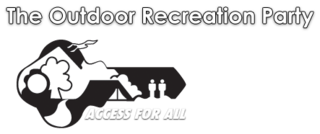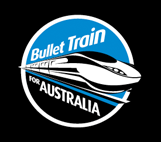
The Outdoor Recreation Party (ORP) was a minor political party originating in New South Wales (NSW), Australia. It professed to represent the outdoor community and interests such as cycling, bushwalking, camping, kayaking, 4WD motoring, skiing, fishing and shooting. It was formally allied with the Liberal Democratic Party.
Australians Against Further Immigration (AAFI) was an Australian far-right political party which described itself as "eco-nationalist", was opposed to mass immigration and aimed for zero net migration. The party was founded in 1989 and registered in 1990, and ceased to exist in 2008.

The Libertarian Party, formerly known as the Liberal Democratic Party, is an Australian political party founded in Canberra in 2001. The party espouses smaller government and supports policies that are based on classical liberal, libertarian principles, such as lower taxes, opposing restrictions on civil liberties, decentralisation, utilising nuclear energy, and the relaxation of smoking laws.

The Non-Custodial Parents Party was a minor political party in Australia registered between 1999 and 2020. It supported less government control of many aspects of daily family life, focusing on reform of family law and child support.
The No Goods and Services Tax Party, previously the Abolish Child Support and Family Court Party, was a minor Australian political party registered between 1997 and 2006 which fielded candidates between the 1998 and 2004 federal elections. The change of name in 2001 was largely a response to the Howard Government's implementation of the Goods and Services Tax. It polled low totals. One Nation founder David Ettridge contested the Senate in Queensland in 2001 for the party.
The Republican Party of Australia was a minor Australian political party dedicated to ending the country's monarchy and establishing a republic. It was formed in 1982 and registered by the Australian Electoral Commission on several occasions prior to being voluntarily deregistered in 2021. It was not linked with the Australian Republic Movement.
Peter James Breen is a former Australian politician. He was a solicitor before entering politics, achieving a Diploma of Law from Sydney University. He was originally a member of the Liberal Party, serving as President of the Campbelltown Young Liberals 1971–1972. From 1995 to 1998 he was Secretary of the Australian Bill of Rights Group, and in 1998 joined Reform the Legal System. In the 1999 New South Wales election he was elected to the Legislative Council.

Pirate Party Australia is a political party in Australia that had traditionally represented civil liberty issues, but had also expanded into more traditional areas of policy. It was a Pirate Party which was based on the Pirate Party of Sweden, and continued to develop a comprehensive policy platform since its formation based on the Pirate ethos.

The United Australia Party (UAP), formerly known as Clive Palmer's United Australia Party and the Palmer United Party (PUP), is an Australian political party formed by mining magnate Clive Palmer in April 2013. The party was deregistered by the Australian Electoral Commission in 2017, revived and re-registered in 2018, and voluntarily deregistered in 2022. The party fielded candidates in all 150 House of Representatives seats at the 2013 federal election. Palmer, the party's leader, was elected to the Division of Fairfax and it reached a peak of three senators following the rerun of the Western Australian senate election in 2014. When the party was revived under its original name in 2018, it was represented by ex-One Nation senator Brian Burston in the federal parliament.

Bullet Train for Australia was an Australian political party, registered from 2013 to 2017. It was a single-issue party campaigning for a fast implementation of high-speed rail. It advocated that the first stage of the bullet train should run from Melbourne to Newcastle via Canberra and Sydney, and be built within 5 years.

The Australian Cyclists Party was a minor political party in Australia. It was registered with the New South Wales Electoral Commission in 2014, and unsuccessfully contested the 2015 New South Wales state election. It was also registered later with the Victorian Electoral Commission, and unsuccessfully contested the 2014 Victorian state election. It registered with the Australian Electoral Commission for federal elections on 20 August 2014 and voluntarily deregistered on 5 September 2017.

The Arts Party is an Australian political party inspired by the importance of the arts and creative action. The party was voluntarily deregistered with the Australian Electoral Commission on 25 June 2019, but remains registered for local elections with the New South Wales Electoral Commission.

The Australian Equality Party (Marriage) (also AEP; formerly Australian Equality Party) was an Australian political party founded by Jason Tuazon-McCheyne. The AEP had a platform that promoted equality and human rights, particularly in relation to the gay, lesbian, bisexual, transgender, intersex and queer (GLBTIQ) community. The party's goal was to get AEP Leader, Jason Tuazon-McCheyne, elected to the Senate at the 2016 Federal Election. The party was deregistered voluntarily on 26 March 2018.

CountryMinded was an Australian political party formed in 2014 that claimed to represent the interests of regional Australians whose livelihoods depend either directly or indirectly on agricultural production. The party was founded by a group of people looking for accountable regional representation, including two brothers from New South Wales, David and Peter Mailler as the Country Party of Australia, and changed its name to CountryMinded in September 2015. In 2018, the party merged with the Australian Democrats.

Yellow Vest Australia (YVA), until 9 April 2019 known as the Australian Liberty Alliance (ALA), was a minor right-wing to far-right political party in Australia. The party was founded by members of the Q Society and has been described as the political wing of Q Society. The leader was Debbie Robinson (President), who was also national president of the Q Society. On 4 September 2020, the Australian Electoral Commission removed the Yellow Vest Australia from the registered political party list.
Civil Liberties & Motorists Party, formerly the Motorists Party; Civil Liberties, Consumer Rights, No-Tolls; Consumer Rights & No-Tolls Party; No-Tolls.org; No Tolls, No Sell Offs; and Consumer Rights & No-Tolls is a Queensland-based political party. It has been registered in Queensland since 2015.

The Seniors United Party of Australia (SUPA) was an Australian political party. It was known as Seniors United NSW until 3 March 2016. The party was founded by Ray Morritt, Nick Agnew, Frank Fitzpatrick and Neil Smith who were dissatisfied with the NSW Government's legislation on retirement villages and other seniors issues. The party was deregistered by the AEC on 29 June 2022.

Flux, also known as Flux the System! and Liberals For Climate - The Flux Network, was a political party and movement that aimed to replace the world's elected legislatures with a new system known as issue-based direct democracy (IBDD). Flux originated in and was most active in Australia, but also had groups existing in the United States and Brazil.
The Mature Australia Party was a minor political party registered for federal elections in Australia between 2014 and 2017.

The Small Business Party (SBP) is a political party in New South Wales, Australia. Their party advocates for the small business sector. The party was founded in 2017 by Angela Vithoulkas, a City of Sydney councillor and café-operator.













